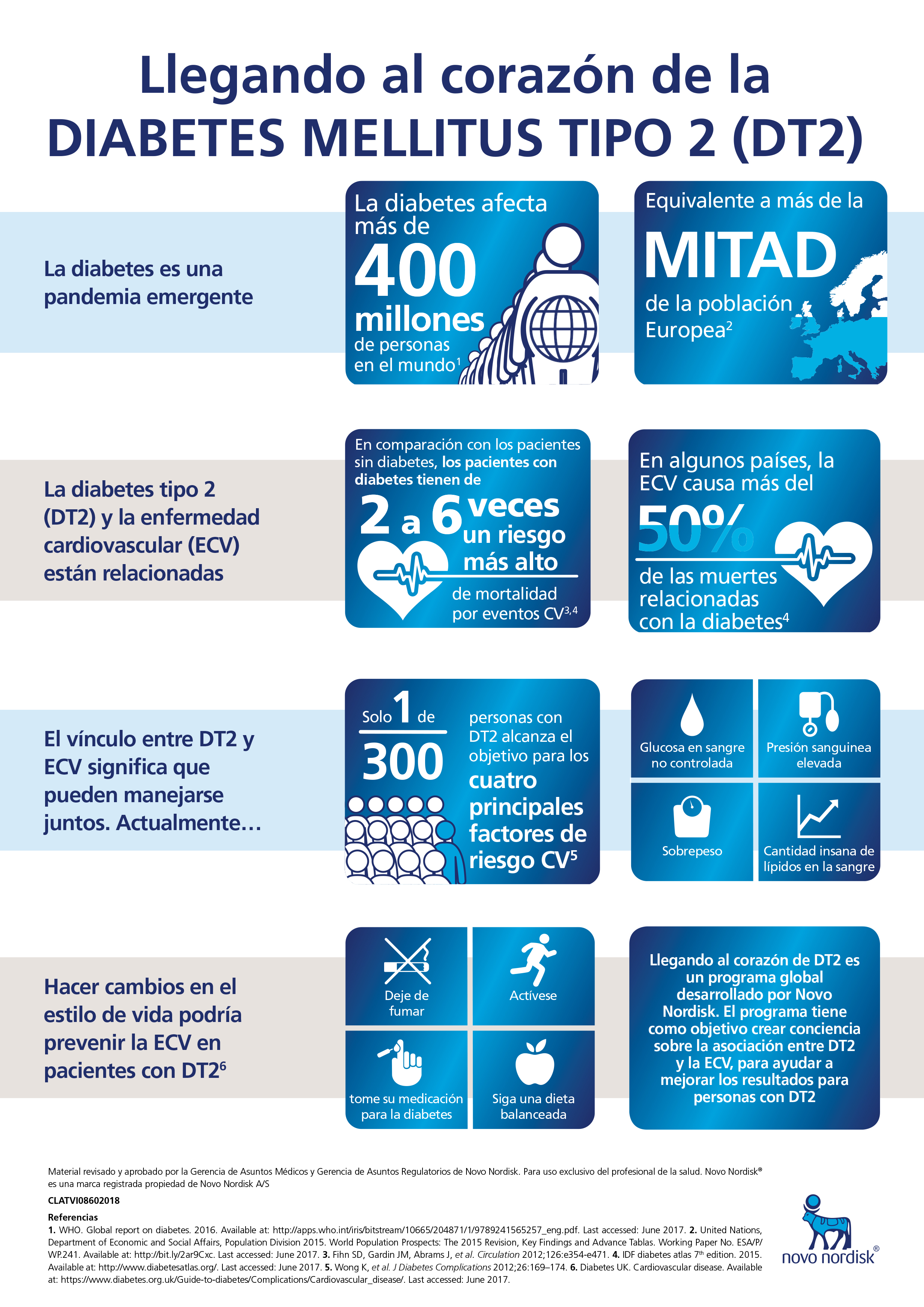The medical treatment of Type 2 Diabetes mellitus should be aimed at reducing the risk of cardiovascular death.
- According to figures published by the International Diabetes Federation, an estimated 425 million people are currently living with diabetes worldwide.1
- Type 2 diabetes is a complex metabolic disorder that is characterized by elevated glucose levels and is associated with a high risk of cardiovascular complications.
Panama, October 2018. Novo Nordisk held “Go Cardio” in Panama City, the largest scientific event in Central America and the Caribbean on the treatment of diabetes and its important relationship with cardiovascular health.
Dr. Ileana Chiari-Shan, Medical Director of Novo Nordisk, said: “It is very pleasant for the company to carry out this initiative. Go Cardio, is an event that brings together doctors from Central America and the Caribbean, of different specialties, which will be updated on the most recent research in type 2 diabetes and its relationship with cardiovascular health; as well as the new driving guides. Conducting medical education events at this level reflects Novo Nordisk’s commitment to share the latest advances in innovative treatments and provide the medical community with up-to-date knowledge that allows them to control patients on key aspects of their disease and improve thus his quality of life.”
The speakers of the meeting were medical specialists from Mexico, Colombia, Central America, and the Caribbean, who will discuss the comprehensive treatment of patients with type 2 diabetes and the efficacy and safety of new treatment approaches, emphasizing the findings on the cardiovascular health of the Diabetic.
Diabetes affects 425 million people worldwide, and it is estimated that in 2045, it will affect almost 629 million, according to estimates by the International Diabetes Federation.
1. Diabetes is a condition in which blood sugar (or glucose) is at a high level. This is because the body does not produce or does not properly use insulin, a hormone that helps cells transform glucose, which comes from food, into energy. Without enough insulin, glucose stays in the blood, and over time, this excess can have serious complications.
In the case of type 2 diabetes, it is a complex metabolic disorder that is characterized by hyperglycemia and is associated with a high risk of cardiovascular complications.
2. All patients with type 2 diabetes have a high cardiovascular risk.2 58% of the deaths of patients with type 2 diabetes are due to cardiovascular causes.
On average, a 50-year-old individual with diabetes, and no history of cardiovascular disease will die six years earlier compared to someone without diabetes.
3. Type 2 diabetes is also associated with an increased risk of myocardial infarction.
4. The incidence of disease cardiovascular increases with age, and there is variation between countries, with the highest rates observed in low and middle-income settings compared to high-income countries.
5. According to the International Diabetes Federation, cardiovascular diseases consume a significant part of the resources allocated to diabetes nationwide.
6. According to US data, 20 percent of total days of hospitalization and 15 percent of visits to the doctor’s office are due to this chronic complication of diabetes.
On the other hand, care related to cardiovascular diseases represents the largest proportion of diabetic health expenses: the expenses of one in four hospitalizations for diabetes are a consequence of cardiovascular diseases and 15 percent of the costs of medical consultations and are related to cardiovascular diseases.
At the same time, diabetes is responsible for more than a quarter of the expenditure on cardiovascular diseases.
7. Diabetes requires a comprehensive control plan that offers patient education in order to make documented decisions about diet, exercise, and weight; effective control of your blood glucose, lipid, blood pressure, and cholesterol levels; correctly access and use medications, in addition to regularly attending exams to detect complications.
Innovative treatment: Liraglutide
Liraglutide is a state-of-the-art drug that is used for the treatment of adult patients with type 2 diabetes mellitus. It belongs to the pharmacological group of glucagon-like peptide analogs type 1 (GLP-1), a hormone of the incretin family that stimulates the release of insulin by the pancreas and lowers blood glucose levels, also favoring weight loss.8,9
The LEADER clinical study (Liraglutide Effect and Action in Diabetes: Evaluation of cardiovascular outcome Results) is a phase 3B, multicenter, international, double-blind, randomized, placebo-controlled study to assess the cardiovascular safety of liraglutide. Nine thousand three hundred forty patients participated globally; half received standard treatment plus liraglutide, and the other half received only standard treatment. The result of the LEADER study revealed that liraglutide reduced the risk of death from cardiovascular events by 22% in patients with type 2 diabetes and high cardiovascular risk. 8.9
“Novo Nordisk is committed to ensuring the safety of patients receiving diabetes treatments. The LEADER study, in addition to confirming cardiovascular safety, showed that it could additionally reduce the risk of death from cardiovascular events, in type 2 diabetic patients with high cardiovascular risk. This can give the person with diabetes a higher life expectancy,” said Dr. Ileana Chiari-Shan, Medical Director of Novo Nordisk Central America and the Caribbean.
About Novo Nordisk
Based in Denmark, Novo Nordisk is a global health care company with over 90 years of innovation and leadership, this heritage has given us the experience to help people overcome other chronic conditions such as hemophilia, developmental disorders, and obesity Novo Nordisk employs approximately 41,400 people in 79 countries, and markets its products in more than 165 countries.





